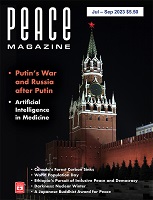Paul Dekar
Graeme MacQueen, a scholar, peace activist, and compassionate friend, passed away peacefully at his home in Dundas, Ontario on April 25, 2023, surrounded by his family.
After earning his Ph.D. from Harvard University, Graeme
embarked on a journey in academia, joining the Department of Religious Studies at McMaster University. He specialized in Asian religion and, in the early 1980s, was instrumental in establishing the Centre for Peace Studies (CPS).
The creation of CPS was inspired partly by the work of the Peace Research Institute, co-founded by Alan and Hannah Newcombe, and by involvement in the peace movement. In 1981, in collaboration with the university’s ad-hoc Committee for Canada-Latin American Friendship, Graeme played a key role in inviting Adolpho Pérez Esquivel, the 1980 Nobel Peace Prize laureate, to the campus. During the 1984-1985 academic year, he, Joanna Santa Barbara, and I introduced the ‘Introduction to the Study of Peace’ course, which continues to draw large student cohorts.
Graeme was not a passive academic. He was front and center at peace demonstrations, evident in a Hamilton Spectator photograph dated June 11, 1982, where he is seen with fellow activists, ready to depart for one of the largest peace demonstrations in New York City. Graeme described the rally as a “morale booster,” adding, “Just being with 500,000 people who think the way you do is bound to be an uplifting experience… People are going to look at their television and wonder why 500,000 are there.”
Over the next forty years, Graeme was actively involved in peace-building efforts in various conflict zones, including Afghanistan, India, and Sri Lanka. Following retirement, he committed his time to research, writing, and advocacy, critiquing the underpinnings of the so-called War on Terror. In his book, The 2001 Anthrax Deception: The Case for a Domestic Conspiracy, Graeme argued that elements within the U.S. government may have been complicit in attacks on their own citizens and carrying out the international crime of aggression against other nations to further their agendas.
Graeme was a world citizen. His dedication to global peace and justice did not go unnoticed. In 1994, the Hamilton Mundialization Committee recognized his contributions to universal peace, justice, and world citizenship. Graeme always emphasized that a deep spirituality inspired his work. In addition to his peace-related books, he penned a novel, Journey to the City of Six Gates, and several short stories.
Until he became debilitated by illness, Graeme stayed involved with the Peace Think Tank, the Gandhi Peace Festival, Democracy Probe, and other local organizations. He consistently contributed thought-provoking papers aimed at protecting democracy, addressing severe inequality, and promoting the common good.
Devoted to his wife Sharon, daughter Jessica, and his extended family, Graeme also nurtured friendships worldwide. As we mourn the loss of this eminent scholar, tireless peace activist, and dear friend, we also celebrate his legacy of advocating for a more peaceful and just world.
Paul Dekar is a retired theologian who formerly taught in the peace studies program at McMaster University with Graeme MacQueen.



